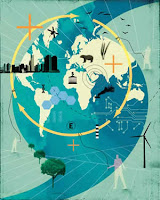Points of Inflection
 By Martha Minow (*)
By Martha Minow (*)Although historians will surely devote much ink—or bytes—to the financial crisis, I believe that this time will be known as an inflection point in world history because of huge revolutions under way in the world—changes that make this an electrifying time to be in the legal profession. Consider the information technology revolution; the biomedical revolution, including genetic breakthroughs, biotechnology and nanotechnology; globalization affecting economic exchanges of legal and professional services; and the worldwide spread of biological and computer viruses, cultural trends and more. It’s also a time of great resource scarcity, global climate change, mass population growth and migrations of people.
These shifts each day generate fundamental questions whose answers will alter the shape of the human experience. And I am certain that lawyers will play indispensable roles in tackling the issues raised by these developments and harnessing opportunities to secure orderly change and enhance human welfare. Lawyers are already working hard to address complex questions: Who owns a cell line? A double-click icon? A digitized form contract term? When should regional, domestic or international standards govern antitrust, privacy, carbon trades, disclosure of food additives, cybersecurity? What rules should govern financial morals to avoid a repeat of the subprime mortgage crisis—or the next financial crisis we have not yet identified? How can the information revolution lessen rather than exacerbate the gap between the haves and the have-nots—when, despite extraordinary world wealth, 2.8 billion people live on less than $2 a day? What mechanism should be put in place to monitor the auditor who vouches for clean energy in carbon trading markets? What, if any, rules should restrict privatizing water or other basic resources? The challenge is to develop and strengthen common values that can guide encounters and collisions between people of different religions and traditions. For example, lawyers could develop rules about borders and citizenship that promote fairness and free movement without overburdening any particular country. What could be better than to have the chance to tackle vital, hard questions like these, and make a difference in the world?
(*) Martha Minow is the Jeremiah Smith, Jr. Professor of Law and the Dean of Harvard Law School. She teaches civil procedure, constitutional law, family law, international criminal justice, jurisprudence, law and education, nonprofit organizations, and the public law workshop. She is known as an expert in human rights and advocacy for members of racial and religious minorities and for women, children, and persons with disabilities, she also writes and teaches about privatization, military justice, and ethnic and religious conflict.


Comments